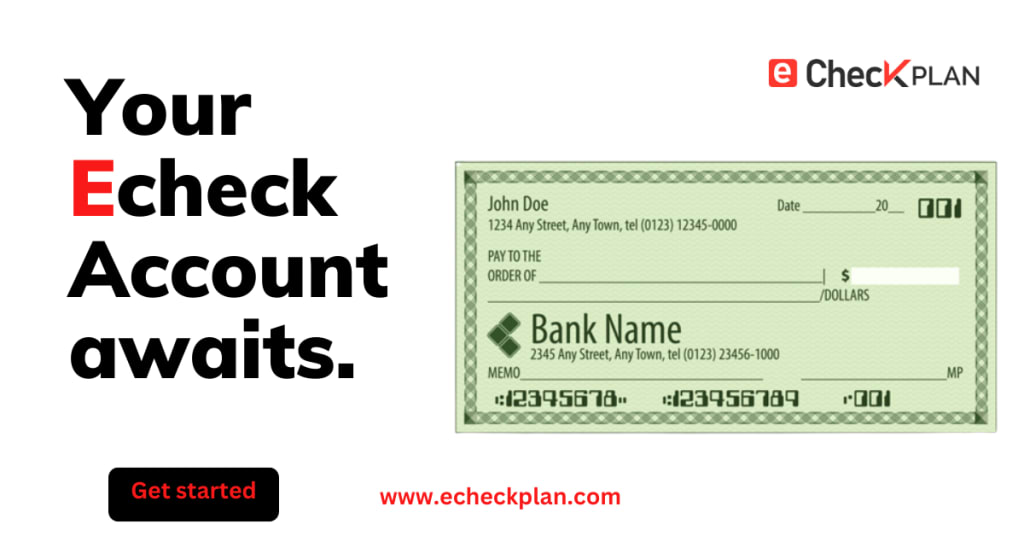Echeck Payment Processing: Unlocking New Opportunities for Businesses
In the ever-evolving landscape of digital payments, businesses are constantly seeking secure and convenient methods to process transactions. One such solution that has gained significant traction is echeck payment processing. Echecks, or electronic checks, offer an electronic alternative to traditional paper checks, providing businesses with a range of benefits and unlocking new opportunities. This article will delve into the world of echeck payment processing, exploring its advantages, implementation process, and the potential it holds for businesses in various industries.

1. Understanding Echeck Payment Processing:
Echeck payment processing is a digital payment method that enables businesses to accept payments electronically by leveraging the Automated Clearing House (ACH) network. Similar to paper checks, echecks are a means of transferring funds directly from a customer's bank account to the merchant's account. However, echecks eliminate the need for physical checks, offering a faster, more secure, and cost-effective alternative.
2. Advantages of Echeck Payment Processing:
2.1 Convenience and Accessibility: Echecks provide convenience and accessibility to both businesses and customers. Customers can make payments directly from their bank accounts without the need for credit cards or other payment instruments. This widens the customer base for businesses, including those who may not have credit cards or prefer not to use them for online transactions.
2.2 Lower Transaction Costs: Echeck payment processing generally incurs lower transaction costs compared to credit card transactions. This can significantly benefit businesses, particularly those with high transaction volumes or lower-margin products. The reduced fees associated with echeck processing can contribute to improved profitability and competitiveness.
2.3 Faster Settlements: Echecks offer faster settlement times compared to traditional paper checks. With echeck payment processing, funds can be transferred and settled within a matter of days, rather than waiting for the physical check to be mailed and processed. This accelerated settlement process enhances cash flow management for businesses and eliminates the uncertainty associated with paper check processing.
2.4 Enhanced Security: Echeck payment processing incorporates robust security measures, including encryption and authentication protocols, to safeguard sensitive customer information and mitigate the risk of fraud. The secure nature of echecks inspires trust and confidence in customers, further strengthening the relationship between businesses and their clientele.
2.5 Recurring Payments and Subscription Models: Echecks are particularly advantageous for businesses that rely on recurring payments or subscription models. By utilizing echeck payment processing, businesses can automate and streamline their billing processes, ensuring timely and hassle-free collections. This convenience can enhance customer satisfaction, reduce churn rates, and provide businesses with predictable revenue streams.
3. Implementing Echeck Payment Processing:
Implementing echeck payment processing involves a series of steps to ensure seamless integration and optimal functionality:
3.1 Partnering with a Payment Processor: To begin accepting echeck payments, businesses need to partner with a reliable payment processor that offers echeck processing capabilities. These payment processors act as intermediaries between the business, the customer's bank, and the ACH network.
3.2 Merchant Account Setup: Once a payment processor is selected, businesses must set up a merchant account to facilitate echeck transactions. This involves providing relevant business information and undergoing a verification process. The payment processor will guide businesses through the necessary requirements and assist in the account setup.
3.3 Integration and Customization: After the merchant account is established, businesses will need to integrate the echeck payment processing solution into their existing payment infrastructure. Payment processors typically provide APIs and documentation to facilitate seamless integration with websites, mobile applications, or point-of-sale systems. Customization options may also be available to align the payment experience with the brand's aesthetics.
3.4 Compliance and Security: To ensure compliance with industry regulations and protect customer data, businesses must adhere to strict security standards. Payment processors typically provide guidance on implementing appropriate security measures, such as encryption, tokenization, and secure data transmission protocols.
3.5 Testing and Deployment: Before launching echeck payment processing, thorough testing should be conducted to ensure seamless functionality and identify any potential issues. Payment processors may offer test environments or sandboxes to simulate transactions and validate the integration. Once testing is complete, the solution can be deployed for live transactions.
4. Opportunities for Businesses:
4.1 Ecommerce: Echeck payment processing opens doors for businesses operating in the e-commerce space. It allows for seamless online payments, catering to customers who prefer bank transfers or do not have credit cards. Ecommerce platforms, marketplaces, and online retailers can expand their customer base and improve conversion rates by offering echecks as a payment option.
4.2 Subscription-Based Services: Businesses offering subscription-based services, such as software-as-a-service (SaaS) providers, membership platforms, or online streaming services, can greatly benefit from echeck payment processing. The recurring payment capabilities enable efficient billing cycles and reduce customer churn, contributing to predictable revenue streams.
4.3 B2B Transactions: Echeck payment processing also presents opportunities in business-to-business (B2B) transactions. Many businesses prefer to pay suppliers or service providers via echecks due to their convenience, lower costs, and enhanced security. Implementing echecks as a payment option can attract B2B customers and foster stronger business relationships.
4.4 High-Risk Industries: Certain industries, such as online gambling, adult entertainment, or nutraceuticals, may face challenges when it comes to traditional payment methods. Echeck payment processing offers a viable solution for businesses operating in high-risk industries, allowing them to accept payments securely and mitigate potential risks associated with credit card chargebacks.
Conclusion:
Echeck payment processing unlocks new opportunities for businesses across various industries by providing convenience, cost savings, faster settlements, enhanced security, and streamlined recurring payments. By integrating echecks into their payment systems, businesses can expand their customer reach, improve cash flow management, and drive revenue growth. As the digital payment landscape continues to evolve, embracing echeck payment processing can position businesses for success in an increasingly competitive marketplace.
About the Creator
eCheckplan
ECheckplan is the leading payment facilitator bridging the gap between merchants and merchant account providers.






Comments
There are no comments for this story
Be the first to respond and start the conversation.